Key takeaways:
- Wildlife conservation requires community involvement and personal connection to nature, fostering empathy towards wildlife.
- Community workshops enhance awareness and provide practical skills, empowering participants to take meaningful action in conservation efforts.
- Key concepts learned include the interconnectedness of local ecosystems and the importance of advocacy in shaping conservation policies.
- Effective workshops encourage open sharing, interactive learning, and the value of participant feedback for improvement.
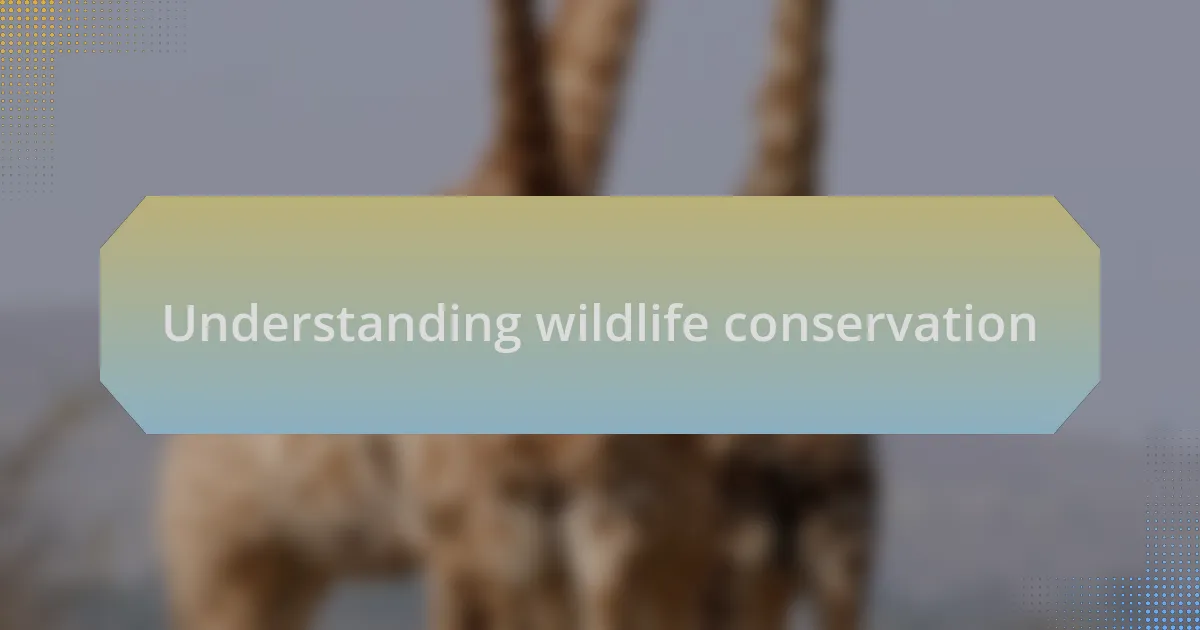
Understanding wildlife conservation
Wildlife conservation, at its core, is about protecting the delicate balance of ecosystems that sustain life on our planet. I remember attending a community workshop where a local biologist shared the story of a nearly extinct bird species. Hearing about the passionate efforts of volunteers who banded together to create safe habitats was truly inspiring; it made me realize how individual actions can collectively lead to significant change.
As I delve deeper into the nuances of wildlife conservation, I can’t help but wonder how often we take our natural world for granted. I once joined a cleanup project near a river where many species depended on the water for survival. Watching the environment slowly come alive again after our efforts drove home the importance of community involvement and responsibility.
Conservation isn’t just about saving endangered species; it’s also about fostering a connection to nature. In one workshop, I met someone who shared poignant stories of family camping trips and the profound bond formed with wildlife. These personal narratives highlight that understanding wildlife conservation starts with fostering empathy for the creatures we share our world with. What stories about wildlife connection resonate with you?
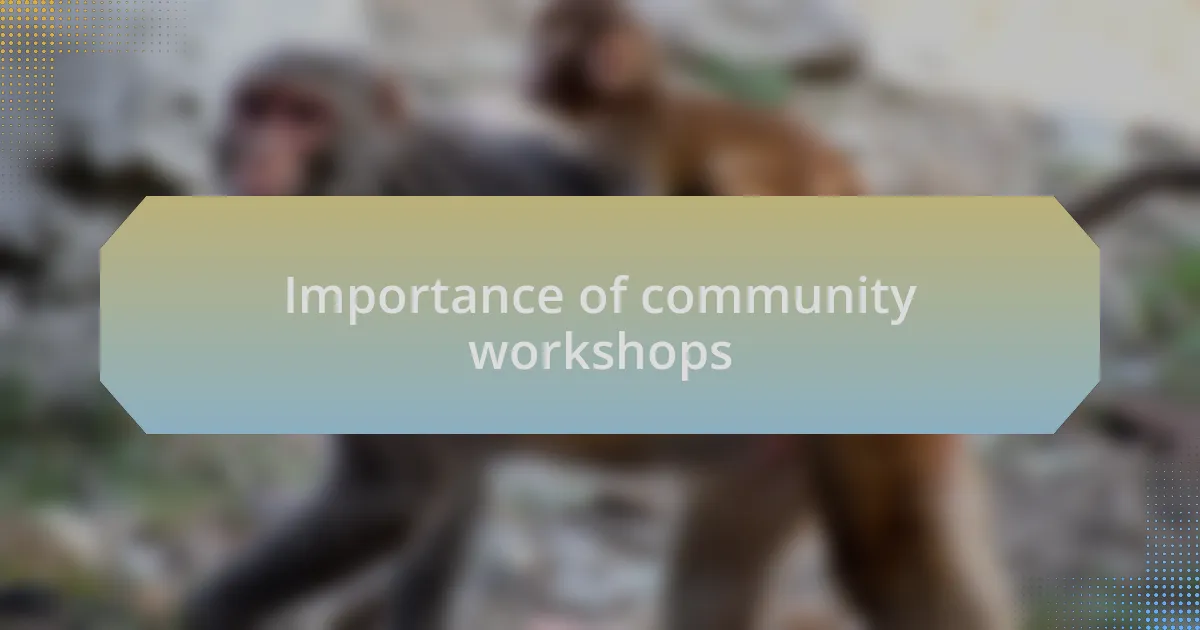
Importance of community workshops
Community workshops play a crucial role in raising awareness about wildlife conservation. I recall participating in one session where participants shared their own experiences with local wildlife issues. It struck me how much collective knowledge we held; it’s easy to feel isolated in our conservation efforts, but these gatherings remind us that we’re all part of a larger community with a shared responsibility.
Moreover, workshops often provide essential hands-on training, empowering individuals to take action. I remember learning about habitat restoration techniques, which felt incredibly rewarding. Once I applied those skills to a local project, witnessing the transformation of a brownfield into a thriving green space was exhilarating. Have you ever considered how much more impactful our efforts can be when we equip ourselves with the right tools and knowledge?
Perhaps the most significant takeaway from these community workshops is the connections formed among participants. I still keep in touch with several people I met during these events, and together we’ve tackled various conservation initiatives since. Isn’t it wonderful how such gatherings can forge friendships that not only enrich our lives but also amplify our impact in protecting the environment?
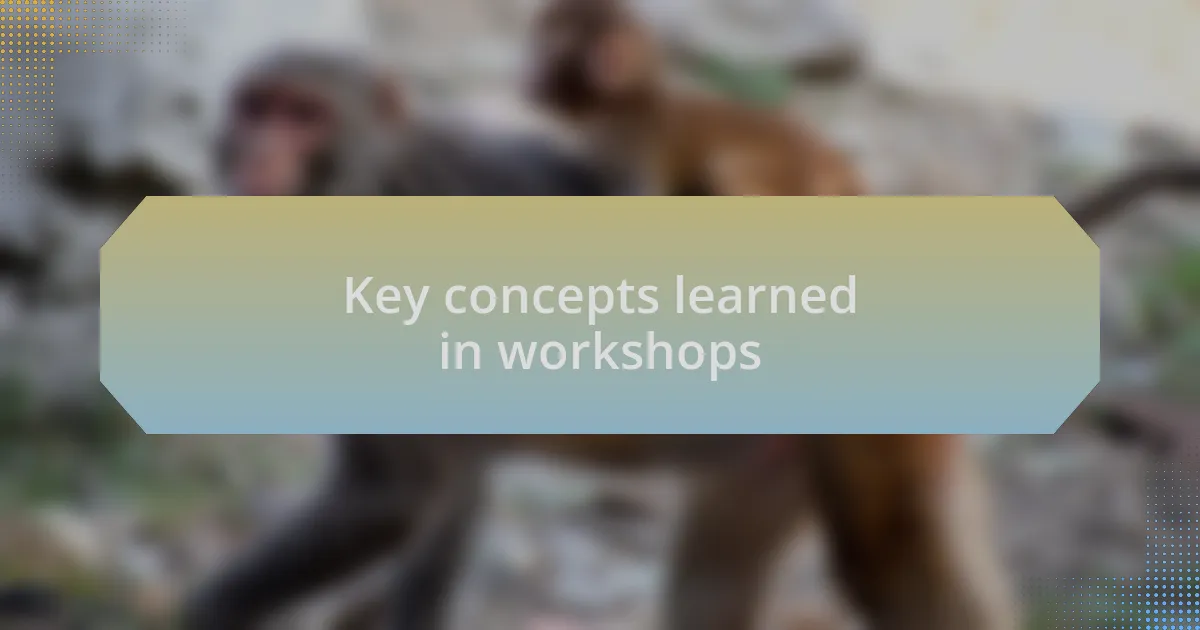
Key concepts learned in workshops
One key concept I learned during these workshops is the importance of local ecosystems and how every species plays a role in maintaining balance. In one workshop, a facilitator shared a story about the decline of a specific bird species and how it led to an overpopulation of insects in the area. Hearing that really hit home for me; it’s staggering to think how a single change in the ecosystem can have such far-reaching consequences. Have you ever pondered how interconnected our environment really is?
Another critical takeaway was the significance of advocacy in wildlife conservation. During a discussion, I learned about effective communication strategies that can influence local policies. I remember feeling inspired when we practiced crafting compelling messages to present to community leaders. It made me realize just how powerful our voices can be when united for a cause. Have you considered how advocating for wildlife can shift perspectives and drive community action?
Lastly, workshops often emphasize the role of volunteerism in conservation. I participated in a project where we collectively cleaned up a beach, which not only beautified the area but also protected marine life from pollutants. Witnessing the immediate impact of our work was profoundly fulfilling. Reflecting on these experiences, I often ask myself, how can one day of dedicated effort contribute to lasting change?
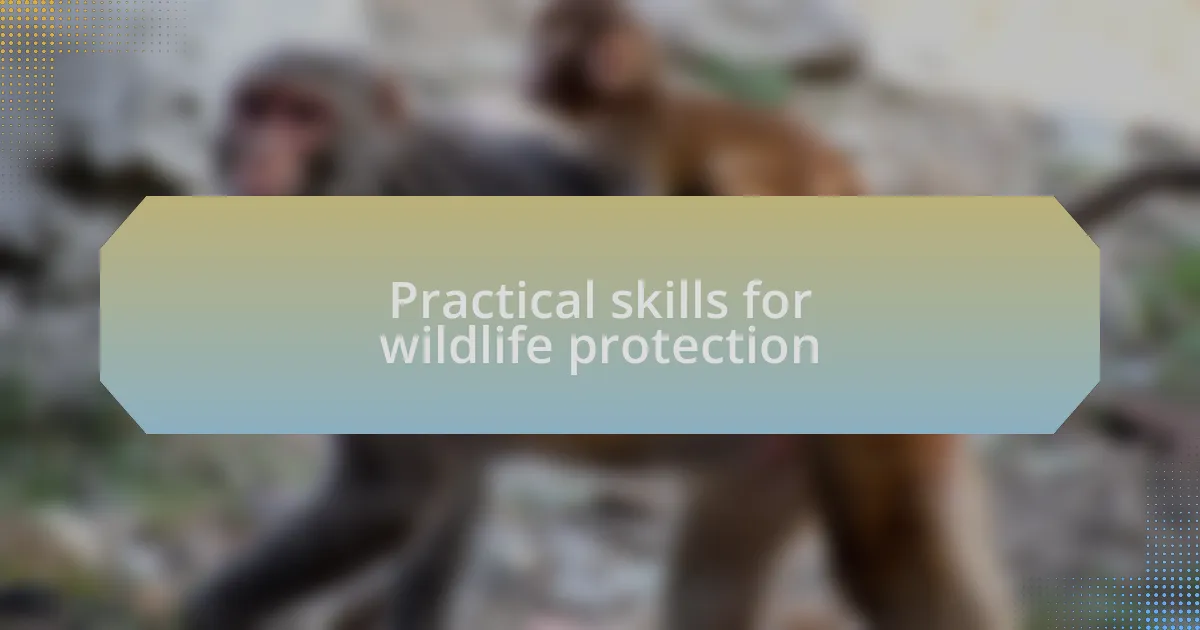
Practical skills for wildlife protection
One of the practical skills I picked up during the workshops was basic wildlife tracking. I remember one session where we learned to identify animal tracks and signs in the field. This not only honed my observational skills but also deepened my appreciation for the secret lives of wildlife. It makes me wonder: how often do we overlook the stories written in the ground beneath our feet?
We also spent time on habitat restoration techniques, focusing on native plants and their significance. I vividly recall working alongside fellow participants to plant saplings that would help restore a local wetland. The sense of community was palpable, and seeing those little trees take root filled me with hope. Have you ever felt the satisfaction that comes from directly contributing to a living ecosystem?
Another essential skill we practiced was data collection for biodiversity monitoring. During one of our outings, I was equipped with a clipboard and a smartphone app to document species sightings. Engaging directly in this scientific process ignited my curiosity about how data could shape conservation strategies. I often think about how our observations today could lead to meaningful changes tomorrow.
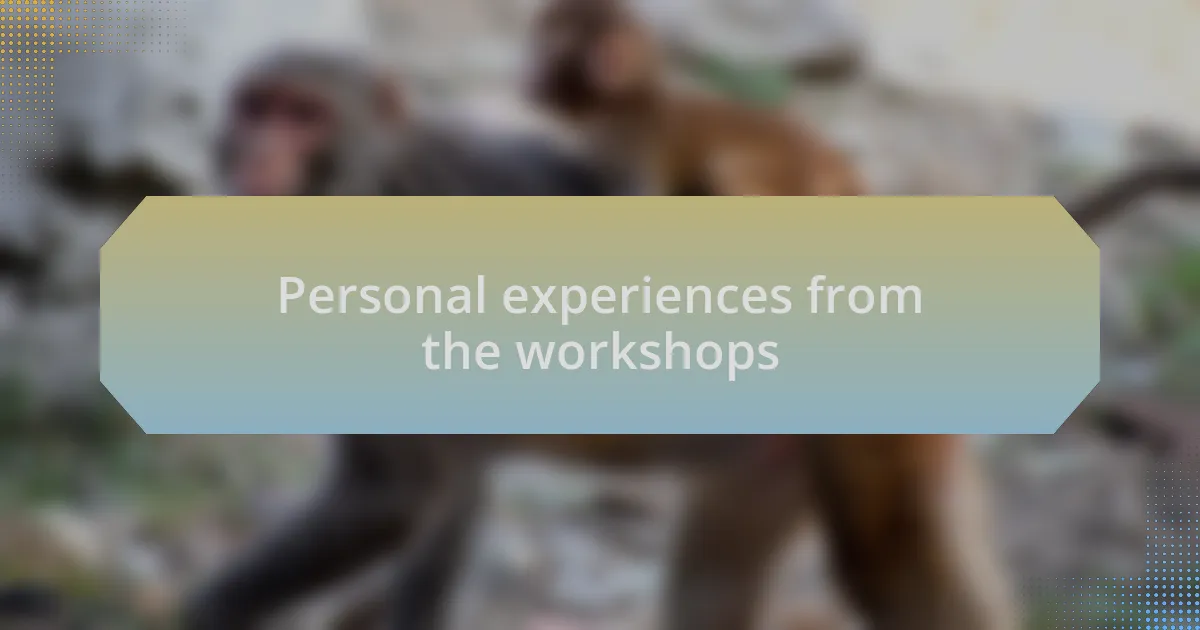
Personal experiences from the workshops
Participating in discussions about community-driven conservation efforts was truly eye-opening. I remember one workshop where a local conservationist shared stories about the challenges faced in protecting endangered species. Listening to her passion and the obstacles she overcame inspired me to think critically about my role in the community. Have you ever felt that spark of motivation from someone else’s experiences?
During hands-on activities, I connected with a diverse group of people who shared a love for wildlife. I recall a moment when we collaborated on creating a bird feeder from recycled materials. The laughter and camaraderie that arose while crafting something for the local wildlife made the experience even more rewarding. It struck me how collective efforts can really strengthen bonds within a community, wouldn’t you agree?
I encountered a moment that shifted my perspective while engaging in a panel discussion about the impact of climate change on local fauna. I listened intently as an elderly participant reflected on the changes he had witnessed over decades. His heartfelt remarks about the declining numbers of familiar species resonated with me deeply. It left me pondering: what legacy do we want to leave for future generations?
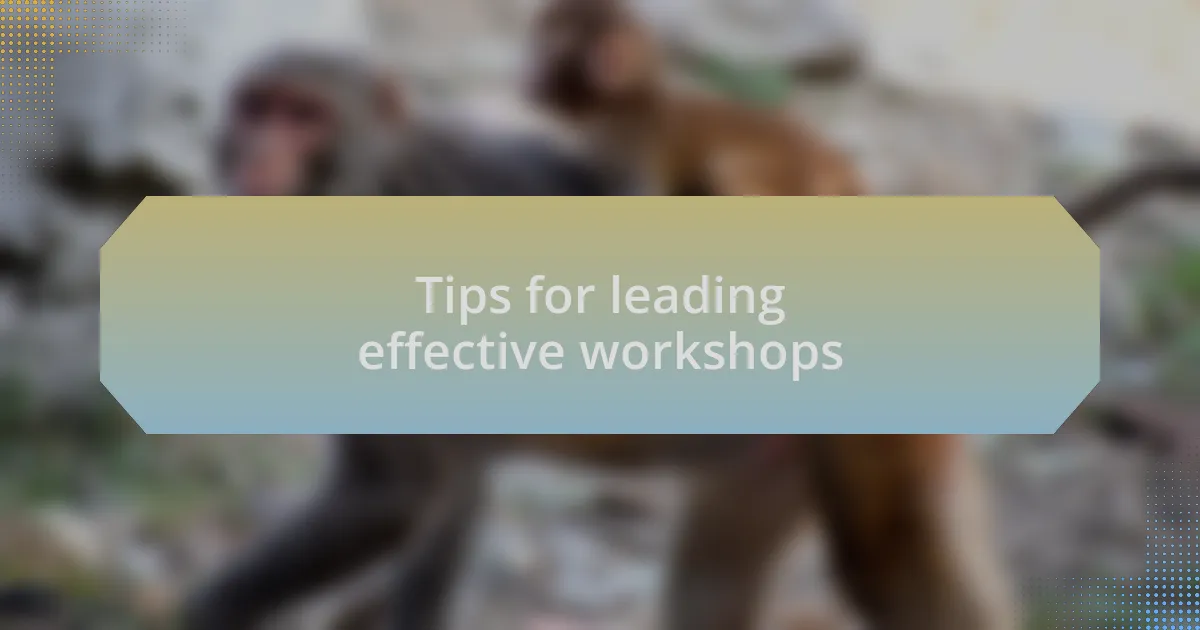
Tips for leading effective workshops
Creating an engaging workshop involves fostering an open and inviting atmosphere. During one of my sessions, I started by encouraging participants to share their own stories about wildlife encounters, which broke the ice and immediately raised everyone’s comfort level. Can you imagine how much richer discussions become when people feel free to openly share their experiences?
Another essential tip is to incorporate interactive activities that cater to a range of learning styles. I once introduced a role-playing game that simulated wildlife conservation challenges. Participants were initially hesitant but soon found themselves deeply engaged, exploring problem-solving from various perspectives. Have you noticed how hands-on experiences can spark creativity and deepen understanding?
Finally, I’ve learned that feedback is vital for continuous improvement. After a workshop, I made it a point to ask participants what resonated with them and how the session could be better. That simple step not only helped refine future workshops but also made folks feel valued. Isn’t it refreshing to see that their input genuinely shapes future initiatives?